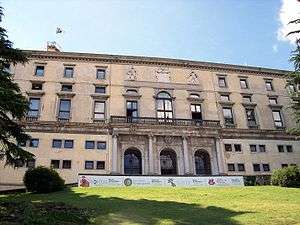Udine Castle

The Castle of Udine (Italian: Castello di Udine) is a historical building in Udine, northern Italy, built upon a hill in the historical center of the city (138 meters under the sea level).
History
The Castle hill is made of drift accumulating during centuries. However, a legend about its origin says that when Attila the Hun (also called the Scourge of God) plundered Aquileia (one of the biggest cities of the Roman Empire at that time) in the year 452, he asked his soldiers to build a hill to see the Aquileia burning. This was made by filling the helmet of each soldier with ground.[1]
The first official statement of the existence of a building on the hill dates back to 983: the Holy Roman Emperor Otto II donated to Rodoaldo, Patriarch of Aquileia a "castrum", a military building.
The present building has the form of a palace and it was built on the ruins of a fortress destroyed in the year 1511 by an earthquake. The construction had started in 1517 and the works had lasted for 50 years. The external decoration of the palace and the paintings in the Parliament Hall are due to Giovanni da Udine, one of the pupils of Raphael.
The council of the Patria del Friuli was one of the first parliaments in the world, and it was suppressed after the French occupation in 1797.
Today the castle hosts the History and Art Museum of the City of Udine.
-

The slope to the Castle
-

Front entrance of the Castle
-
Rear view of the Castle
-

Rear view with the square
-
The Angel of the steeple of the Church of Santa Maria di Castello di Udine
References
Coordinates: 46°03′51″N 13°14′11″E / 46.06417°N 13.23639°E